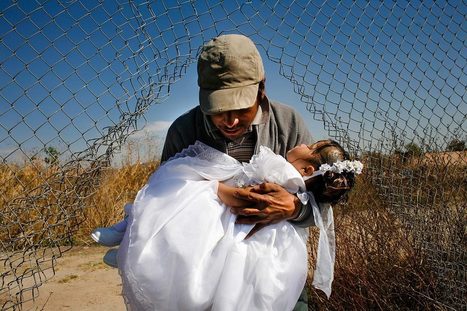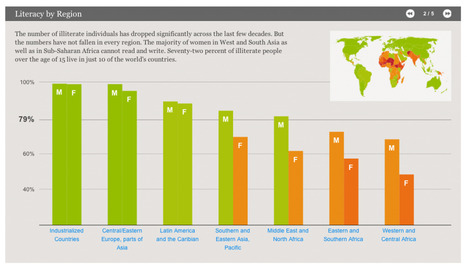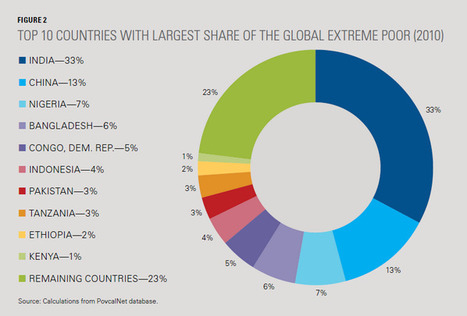For the last 12 months, the global media has been focused on a lot of bad news. But there were other things happening out there too: conservation successes, huge wins for global health, more peace and tolerance, less war and violence, rising living standards, some big clean energy milestones, and a quiet turning of the tide in the fight against plastic. Stories of human progress, that didn’t make it into the evening broadcasts, or onto your social media feeds.
Get Started for FREE
Sign up with Facebook Sign up with X
I don't have a Facebook or a X account

 Your new post is loading... Your new post is loading...
 Your new post is loading... Your new post is loading...
Ella Price's curator insight,
March 28, 2016 9:19 PM
Reminicent of the picture book, "If the World were a Village" by David Smith, this video attempts to make large statistics more meaningful to to a broader audience. The concept is simple, but the impact is profound.
Tags: statistics, development, perspective. 
MsPerry's curator insight,
March 31, 2016 12:57 PM
Reminicent of the picture book, "If the World were a Village" by David Smith, this video attempts to make large statistics more meaningful to to a broader audience. The concept is simple, but the impact is profound.
Tags: statistics, development, perspective. 
Denise Klaves Stewardson's curator insight,
April 1, 2016 4:06 PM
Reminicent of the picture book, "If the World were a Village" by David Smith, this video attempts to make large statistics more meaningful to to a broader audience. The concept is simple, but the impact is profound.
Tags: statistics, development, perspective.

London Kassab's curator insight,
November 3, 2015 9:35 PM
Mexico is having a lot of internal migration within cities. Many different languages are disappearing and for a lot of the people literacy, racism, and other forces can often bring them to urban areas. Also the border isn't the only hope for migrants, bustling cities offer hopes of better lifestyle as well. L.K.
Clayton Nelson's curator insight,
December 16, 2015 11:14 AM
I believe migrants should be allowed to migrate to their destination. But there should of course be policies as to how many people come to one area at a time and such. In my opinion the main problem lies with those who exploit the border and migrate illegally as well as those who don't belong such as terrorists. Once this is resolved migration from Mexico to the United States or to anywhere will be much smoother. CN
tyrone perry's curator insight,
March 23, 2018 12:44 PM
The internal migration going on in Mexico is mainly comprised from the indigenous communities. They think that if they move to the city they can better their lives by getting an education and a wealthy paying job. But as they soon find out there is more problems than jobs and education. many of the personal videos show the hard path many of the people endure with very little success.

Helen Rowling's curator insight,
June 10, 2014 6:37 PM
STUDY OF RELIGION - COMPARISONS OF HAVE & HAVE NOTS. |
analise moreno's curator insight,
October 14, 2014 8:01 PM
This was one of our focuses last chapter. I totally agree with this because woman and as well as men deserve education they need education to have a successful life. I like how she describes this so well and thoroughly she talks about what she wants and needs in her life. 
Raychel Johnson's curator insight,
May 25, 2015 8:42 PM
Summary: In this interview, Jon Stewart talks with Malala Yousafzai, a girl who outwardly fought for women's education, and in doing so, was shot by the Taliban. Even now, she continues to fight for women's equality and their right to education, after she won her Nobel Peace Prize.
Insight: In this interview, the main topic is gender equality, and how it can lead to better education for women, which, in turn, gives women more power. Although developed countries, especially in Western Europe, already display high gender equality, more developing countries, especially in the Middle East, have hardly anything close to gender equality. Even with low amounts of gender equality, people like Malala and advocates in Western countries are striving towards this goal of gender equality.

dilaycock's curator insight,
May 5, 2014 8:52 PM
This information is taken from the World Bank's 2014 report "Prosperity for All." The report looks at "progress to date in reducing global poverty and discusses some of the challenges of reaching the interim target of reducing global poverty to 9 percent by 2020.... . It also reports on the goal of promoting shared prosperity, with a particular focus on describing various characteristics of the bottom 40 percent."
Sid McIntyre-DeLaMelena's curator insight,
May 29, 2014 12:48 PM
This graphic reveals the poorest populations and where they live and even though India and China are economic competitors on the global stage they still have the poorest communities. IN poor communities, the human place is changed by using less structurally sound architecture and disregarding cultural presence for functionality though holding true to cultural presence in individual lives. 
Amanda Morgan's curator insight,
September 18, 2014 11:49 AM
I agree with this article from the Guardian that development should be measured in human rights gains more than economic advancements. While globalization is taking place and allowing countries to trade and maximize profits, a large percent of people in the world are deprived basic human rights and are entirely forgotten about and not valued. |














